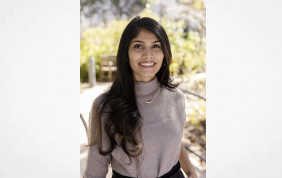Press Release
Header Image: BCLB Executive Director Angeli Patel ’20
Now, in a new online Berkeley Law Executive Education course, BCLB Executive Director Angeli Patel ’20 is building on that foundation to bring more up-to-the-minute ideas to corporate and legal leaders.
ESG University has two tracks: the 30-hour Sustainable Capitalism in Practice for general practitioners and the 8-hour Sustainable Capitalism for Directors, aimed at corporate board directors and C-suite executives. Both are self-paced classes that also offer live office hours with Patel and experts who contributed to the courses.
A new level
Patel says the new course, which begins its first cohort on April 29, builds on the foundation of a previous class, Sustainable Capitalism and ESG Online. That course was developed by Amelia Miazad ’02, who founded BCLB’s Business in Society Institute and is a law professor at UC Davis.
“Our goal is to not just create learnings for today, but to create concrete learnings that will have payoff for executives and for the companies that they work for over the long term,” she says. “When the original course was created, those conversations about ESG and sustainability were so new that companies had no idea how to think about it. And the original course set up the foundations.
“The goal now is to build on the foundations and turn it into practice.”
All eight sessions begin with a brief lecture and also incorporate interviews with practitioners, while two of the modules use a broad range of case studies to help students understand the landscape. A curated reading list for the course includes excerpts of academic papers as well as industry reports, opinion writing from experts, and some media coverage of corporations’ efforts in this arena.
The Sustainable Capitalism in Practice course is aimed at a wide variety of junior, mid-level, and senior professionals, Patel says, including lawyers, regulators, public affairs and policy practitioners, and those in the media and communications field.
The condensed Sustainable Capitalism for Directors course approaches ESG from a cross-functional perspective, exploring both legal and business risks and opportunities to help those who govern an organization be prepared to lead it toward a more sustainable future.
“For a lot of executives and directors, their day-to-day job is not yet about sustainability. Does that mean they’ll never touch this topic? I don’t think so. It’s going to become everybody’s business to know how to build resilient organizations,” Patel says. “What practitioners have to gain from this course is a systems-level understanding of their role, a systems-level understanding of what’s happening in sustainability and its effects on things like marketing, the supply chain, operations, and how you think about hiring.”
A global transition
The course offers knowledge and skills relevant to anyone at any level of a company, she adds. Whether the challenge a company faces is the rise of artificial intelligence or the prospect of a massive decline in non-renewable resources, savvy leaders will need to know how to adapt themselves, their role, and their skill set to meet the new market.
“We’re in the middle of an economic transition from a global standpoint,” she says. “And if we’re not thinking about these things, we’re missing a major opportunity for innovation and leadership.”
While it’s becoming more urgent for companies to adapt, the evolution of ESG and sustainable capitalism remains fast and fluid. Given that dynamic, it’s impossible to create a textbook, Patel says — so the course builds a framework for students using leaders on the ground right now, from founders to general counsels to nonprofit leaders and academics. The live sessions are a place to build a peer community that students can lean on long after they’ve earned their certificate and Continuing Legal Education hours.
“We really dive into practical and day-to-day examples of what’s happening in real time,” Patel says. “You’ll find us reading the latest scathing article about something that just happened, and say, ‘Let’s put ourselves in the shoes of the people in this crisis. What would we have done differently?’ It’s those live sessions that bring these concepts into the present moment.
“It really is a rich community that gets very, very passionately plugged into some of this work we do.”
As always, Berkeley Law’s key location in the Bay Area offers both a widely receptive audience for the course and access to a huge swath of experts. One of the course’s goals, Patel says, is to ensure that anyone who’s investing in, building, or advising companies in the epicenter of global innovation understands that building sustainably is essential to move beyond a variety of difficult challenges, from climate change to social inequality.
Corporations are a key player in finding solutions for the next generations, she adds, because they can scale and reach people and things at a pace that’s unmatched by any other sector of society.
“I couldn’t imagine our center and Berkeley Law playing a more important role,” she says. “What could be a better cause than ensuring that those folks who are running these organizations and with scalable products and services are building into them the goal of durability and shared value creation?
“That’s why I think the work we’re doing is central — and it’s central to the fact that we’re here in Silicon Valley. Because this is where innovation is really happening. And we want to make sure that sustainability is built-in from the beginning.”





